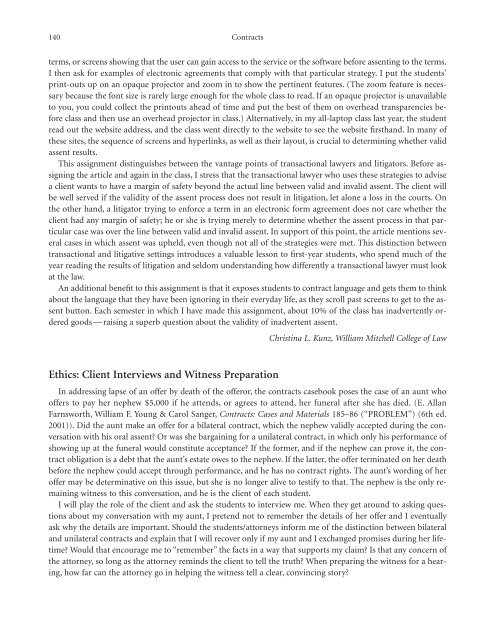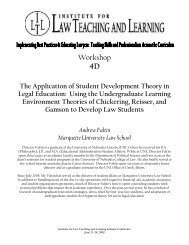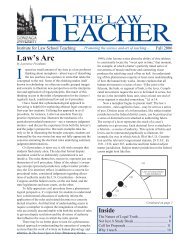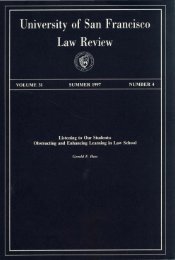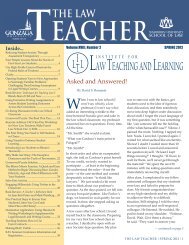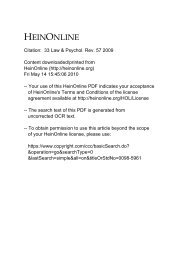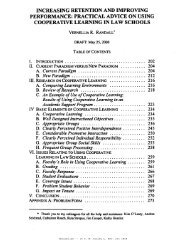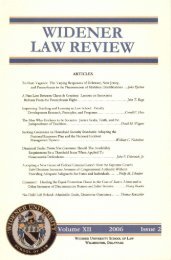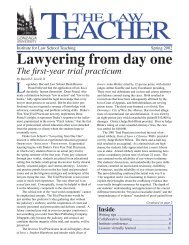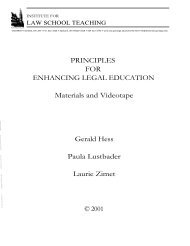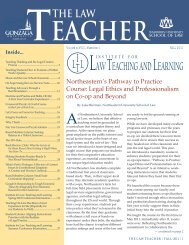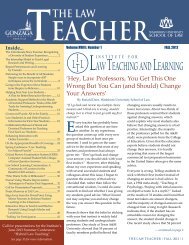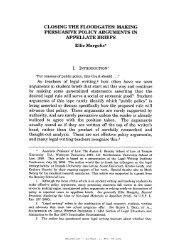Teaching the Law School Curriculum - Institute for Law Teaching ...
Teaching the Law School Curriculum - Institute for Law Teaching ...
Teaching the Law School Curriculum - Institute for Law Teaching ...
You also want an ePaper? Increase the reach of your titles
YUMPU automatically turns print PDFs into web optimized ePapers that Google loves.
140 Contracts<br />
terms, or screens showing that <strong>the</strong> user can gain access to <strong>the</strong> service or <strong>the</strong> software be<strong>for</strong>e assenting to <strong>the</strong> terms.<br />
I <strong>the</strong>n ask <strong>for</strong> examples of electronic agreements that comply with that particular strategy. I put <strong>the</strong> students’<br />
print-outs up on an opaque projector and zoom in to show <strong>the</strong> pertinent features. (The zoom feature is necessary<br />
because <strong>the</strong> font size is rarely large enough <strong>for</strong> <strong>the</strong> whole class to read. If an opaque projector is unavailable<br />
to you, you could collect <strong>the</strong> printouts ahead of time and put <strong>the</strong> best of <strong>the</strong>m on overhead transparencies be<strong>for</strong>e<br />
class and <strong>the</strong>n use an overhead projector in class.) Alternatively, in my all-laptop class last year, <strong>the</strong> student<br />
read out <strong>the</strong> website address, and <strong>the</strong> class went directly to <strong>the</strong> website to see <strong>the</strong> website firsthand. In many of<br />
<strong>the</strong>se sites, <strong>the</strong> sequence of screens and hyperlinks, as well as <strong>the</strong>ir layout, is crucial to determining whe<strong>the</strong>r valid<br />
assent results.<br />
This assignment distinguishes between <strong>the</strong> vantage points of transactional lawyers and litigators. Be<strong>for</strong>e assigning<br />
<strong>the</strong> article and again in <strong>the</strong> class, I stress that <strong>the</strong> transactional lawyer who uses <strong>the</strong>se strategies to advise<br />
a client wants to have a margin of safety beyond <strong>the</strong> actual line between valid and invalid assent. The client will<br />
be well served if <strong>the</strong> validity of <strong>the</strong> assent process does not result in litigation, let alone a loss in <strong>the</strong> courts. On<br />
<strong>the</strong> o<strong>the</strong>r hand, a litigator trying to en<strong>for</strong>ce a term in an electronic <strong>for</strong>m agreement does not care whe<strong>the</strong>r <strong>the</strong><br />
client had any margin of safety; he or she is trying merely to determine whe<strong>the</strong>r <strong>the</strong> assent process in that particular<br />
case was over <strong>the</strong> line between valid and invalid assent. In support of this point, <strong>the</strong> article mentions several<br />
cases in which assent was upheld, even though not all of <strong>the</strong> strategies were met. This distinction between<br />
transactional and litigative settings introduces a valuable lesson to first-year students, who spend much of <strong>the</strong><br />
year reading <strong>the</strong> results of litigation and seldom understanding how differently a transactional lawyer must look<br />
at <strong>the</strong> law.<br />
An additional benefit to this assignment is that it exposes students to contract language and gets <strong>the</strong>m to think<br />
about <strong>the</strong> language that <strong>the</strong>y have been ignoring in <strong>the</strong>ir everyday life, as <strong>the</strong>y scroll past screens to get to <strong>the</strong> assent<br />
button. Each semester in which I have made this assignment, about 10% of <strong>the</strong> class has inadvertently ordered<br />
goods — raising a superb question about <strong>the</strong> validity of inadvertent assent.<br />
Ethics: Client Interviews and Witness Preparation<br />
Christina L. Kunz, William Mitchell College of <strong>Law</strong><br />
In addressing lapse of an offer by death of <strong>the</strong> offeror, <strong>the</strong> contracts casebook poses <strong>the</strong> case of an aunt who<br />
offers to pay her nephew $5,000 if he attends, or agrees to attend, her funeral after she has died. (E. Allan<br />
Farnsworth, William F. Young & Carol Sanger, Contracts: Cases and Materials 185–86 (“PROBLEM”) (6th ed.<br />
2001)). Did <strong>the</strong> aunt make an offer <strong>for</strong> a bilateral contract, which <strong>the</strong> nephew validly accepted during <strong>the</strong> conversation<br />
with his oral assent? Or was she bargaining <strong>for</strong> a unilateral contract, in which only his per<strong>for</strong>mance of<br />
showing up at <strong>the</strong> funeral would constitute acceptance? If <strong>the</strong> <strong>for</strong>mer, and if <strong>the</strong> nephew can prove it, <strong>the</strong> contract<br />
obligation is a debt that <strong>the</strong> aunt’s estate owes to <strong>the</strong> nephew. If <strong>the</strong> latter, <strong>the</strong> offer terminated on her death<br />
be<strong>for</strong>e <strong>the</strong> nephew could accept through per<strong>for</strong>mance, and he has no contract rights. The aunt’s wording of her<br />
offer may be determinative on this issue, but she is no longer alive to testify to that. The nephew is <strong>the</strong> only remaining<br />
witness to this conversation, and he is <strong>the</strong> client of each student.<br />
I will play <strong>the</strong> role of <strong>the</strong> client and ask <strong>the</strong> students to interview me. When <strong>the</strong>y get around to asking questions<br />
about my conversation with my aunt, I pretend not to remember <strong>the</strong> details of her offer and I eventually<br />
ask why <strong>the</strong> details are important. Should <strong>the</strong> students/attorneys in<strong>for</strong>m me of <strong>the</strong> distinction between bilateral<br />
and unilateral contracts and explain that I will recover only if my aunt and I exchanged promises during her lifetime?<br />
Would that encourage me to “remember” <strong>the</strong> facts in a way that supports my claim? Is that any concern of<br />
<strong>the</strong> attorney, so long as <strong>the</strong> attorney reminds <strong>the</strong> client to tell <strong>the</strong> truth? When preparing <strong>the</strong> witness <strong>for</strong> a hearing,<br />
how far can <strong>the</strong> attorney go in helping <strong>the</strong> witness tell a clear, convincing story?


